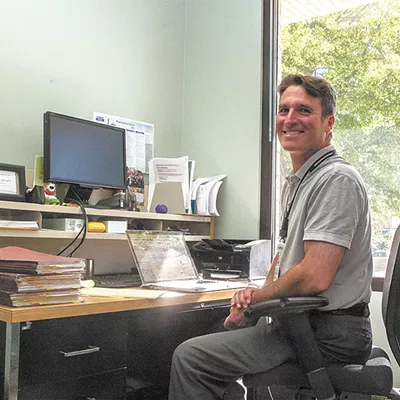
Blaine Stum, 29, is the legislative assistant to Spokane City Councilman Jon Snyder and a member of the Human Rights Commission. He spends his free time researching social issues, writing and creating art.
My childhood was a lot of anger and depression.
I grew up as a gay kid in Spokane Valley and that was like a living hell for me. The church we went to wasn't accepting. Our friend groups weren't accepting. There were a lot of things to deal with that probably contribute to the things I deal with today. Just the tiniest little things would get me pissed as a kid. I didn't have any self-esteem. If I lost a game, I just threw a fit because I thought that I sucked at everything.
The anxiety kind of hit me around the time [I was 23 and] I got outed. The first real panic attack that I can remember being diagnosed as a panic attack, I ended up going to the emergency room because I hyperventilated so bad I couldn't move. And when you're having your first one, it feels like you're having a heart attack. I thought I was dying. I was so terrified. I was with my boyfriend at the time, and I remember just looking at him and saying, "Please call an ambulance. I don't know what's wrong with me." I couldn't control any of my emotions. It's like something goes off in your brain. You feel this "ping." All of a sudden you're in doom. Fight-or-flight response.
You don't know what your triggers are a lot of times. I would be sitting in my constitutional law class and all of a sudden I'd have a panic attack. I had to move, I had to do something, so I would walk out of class and I'd be gone for 30 minutes. My heart was just racing and my mind was like, "You're going to die, you're going to die."
Panic makes it sound like we're running around flailing our arms in the air, being hysterical. But what it really is, is it's like an adrenaline disorder. You get this shot of adrenaline when you don't need it at all. I don't know why it happens. I don't like it happening. But it does.
When I got the diagnosis, I just imagined myself having to go to therapy for my entire life and always having this problem. The more I talked to people and the more I went to therapy, I realized you can get better...
I don't know most of my triggers. One of the things I've noticed that makes me really anxious still is driving. I walk everywhere because I live pretty close to downtown and my job, but it's impacted my ability to see my family because they all live outside of Spokane. When I get in a car I feel good at first, then I start to feel trapped and I have a panic attack. If I'm on the freeway or something, I can't just pull over and go for a walk. That's been probably the most difficult trigger for me to deal with because we rely so much on cars, especially in Spokane.
You get sort of encased in your little bubble with your supportive friends and family, and then you realize there are people out there who think, "Oh, if you have mental illness, I don't want you near me."
I was in the closet for 10 years as a gay man. Why should I be in the closet for my mental illness? Why is that any different? I've been there before. I understand what it feels like to feel like you can't say anything, and I don't want to be in that situation again. It's difficult when you're dealing with something new, but as you get used to it and you're able to talk about it more, it not only helps you process it, but it helps other people understand how to approach it, how to talk about it, and how to better advocate for people who are dealing with it.
People too often assume that if you have a mental illness you need to be pitied. I appreciate that, but I also don't necessarily want people to think that I can't do something just because of my mental illness. We all have our limitations, whether it's mental or physical, but to have somebody, in a kind of roundabout way, whether it's how they treat you or talk to you, say, "Well, you have panic disorder, so maybe we shouldn't have [you] do that." There's a fine line there. Obviously, you want people to be understanding and sympathize, but you don't want people to treat you like you can't accomplish good things.
The conversations around mental illness, especially with respect to violence, just fundamentally need to change. Any research that I've ever seen, and any researcher that's worth their weight, would tell you that mentally ill people are more likely to be victims of violence than the perpetrators of it.
Believe in yourself. I know it's cliché, but it's kind of true. When you first get that diagnosis, it's difficult to believe in yourself, it's difficult to think you're going to be living a productive life later on and realize that you might be able to do huge things. Be very selective of what kind of friends you have. If somebody who you talk to about it isn't willing to accept you because you have a mental illness, they're not worth the time. Try to find things in your life that are pleasurable. Find hobbies. Find things you love and love to do and really immerse yourself in them. ♦





















